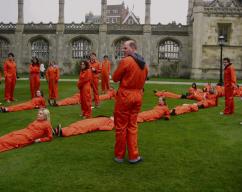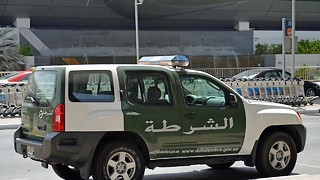Students don jumpsuits for Guantanamo protest
Hundreds of Cambridge students and lecturers yesterday took part in Amnesty’s “Orange Wednesday” in order to register their anger at the continued detention of inmates at Guantanamo.
The event, organised by Cambridge University Amnesty International, involved over 200 participants from Downing, Caius, Trinity, King’s and Emma donning the infamous orange jumpsuits to protest against the human rights abuses taking place in the “War on Terror”. The demonstration, which attracted widespread public attention as orange-clad students attended tutorials and punted down the Cam, culminated in volunteers congregating on King’s Lawn in the shape of the Amnesty candle.
The day was organised as part of Cambridge University Amnesty’s “Terrorism, Security and Human Rights” Campaign, which aims to highlight abuses of civil liberties in the “War on Terror”. Chair of Cambridge Amnesty International Mischa Foxell said, “Whilst most people in Cambridge support an end to human rights abuses in illegal detention centres in principle, there’s also a lot of ignorance about the issues. Hopefully everyone who speaks to someone in a jumpsuit will go away knowing and caring more about the horrific abuses we know are taking place in detention centres across the world.”
Observer Annie Ring said, “It was so inspiring to see all these like-minded people making a stand. But haunting too, knowing what those suits signify: a space created to stand outside of the law, a place where the prisoners have no access to their rights. Guantanamo Bay is an abomination and the shame of our era.”
 The detention camp also drew criticism from senior members of the University. Dr Mary Beard, Classics editor of the Times Literary Supplement, said, “I’m participating to draw attention to the whole issue of illegal detention. And because I feel embarrassed by the British government’s passivity - they have, in effect, acquiesced in this outrageous crime against human and civil rights. I just hope the one-size jump suits will be big enough to fit me!”
The detention camp also drew criticism from senior members of the University. Dr Mary Beard, Classics editor of the Times Literary Supplement, said, “I’m participating to draw attention to the whole issue of illegal detention. And because I feel embarrassed by the British government’s passivity - they have, in effect, acquiesced in this outrageous crime against human and civil rights. I just hope the one-size jump suits will be big enough to fit me!”
Dr Beard’s department was the most active in the demonstration, but overall 11 lecturers from the Classics, Law, English, Geography, History and SPS faculties donned orange jumpsuits to participate in the day. Dr Priya Gopal, lecturer at the English faculty, said: “I think it’s really important that lecturers get involved with student activism. Especially as we are a humanities department, we do need to stand up for wider humane values.”
The situation of detainees is undeniably grim. Under the jurisdiction of a country founded by pilgrims fleeing religious persecution, Muslim detainees are not allowed to wash before prayers, denying them the right to freedom of religion. Copies of the Koran are kicked or defaced and prisoners are stripped naked before female soldiers. There have been prolonged hunger strikes and over 350 acts of self-harm in 2003 alone. Of the 40 who have attempted suicide, three were successful in 2006, whilst two detainees have died in mysterious circumstances. Some are force-fed, a practice human rights lawyer Clive Stafford Smith described as “excruciatingly painful.” The use of “water-boarding” and “strappado”, a torture technique dating from the Spanish Inquisition, have attracted negative public attention yet continue to be used.
Only 10 detainees out of more than 500 have had the right to a trial, and such trials were of questionable integrity given that they were conducted by the US Military itself. Dr Markus Gehring, a Fellow of Robinson College specialising in international law, said, “I think the existence of a prison camp as such is not against international law but I would argue that its operation with elements of torture, and failure to offer a fair trial to the internees, is.”
Dr Molly Warrington, of the Department of Geography, said, “I find it extraordinary that the Unites States, which prides itself on the values of democracy, human rights and the rule of law, uses space in another state – one it despises – to engage in human rights abuses which contravene its laws. That Bush can defend water-boarding and Guantanamo Bay, and still claim that the US occupies the moral high ground, leaves me absolutely speechless.”
Guantanamo is rapidly losing the US international face, drawing condemnation from various international leaders such as Angela Merkel, as well as presidential contenders Barack Obama and John McCain. Colin Powell has said if he could close the base tomorrow, he would.
Catherine Lough
 News / Newnham postgrads referred to homeless charities as College runs out of rooms31 July 2025
News / Newnham postgrads referred to homeless charities as College runs out of rooms31 July 2025 Arts / William Morris’ little-known labours in Cambridge25 July 2025
Arts / William Morris’ little-known labours in Cambridge25 July 2025 Lifestyle / Break-ups in the bubble31 July 2025
Lifestyle / Break-ups in the bubble31 July 2025 News / Lucy Cav secures £47m loan to expand student accommodation30 July 2025
News / Lucy Cav secures £47m loan to expand student accommodation30 July 2025 Theatre / One year, many stages: the fresher actors behind Cambridge theatre31 July 2025
Theatre / One year, many stages: the fresher actors behind Cambridge theatre31 July 2025








